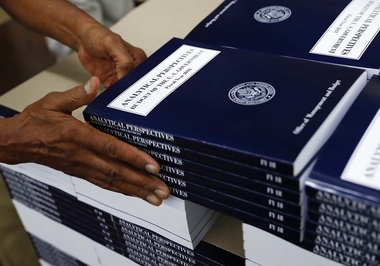Trump budget promises balance in decade, relies on deep cuts

WASHINGTON (AP) — President Donald Trump is proposing to balance the federal budget within a decade by making sharp cuts to social safety-net programs like food stamps and Medicaid and offering optimistic estimates of economic growth and tax revenues to fulfill the promise of a government back in the black.
Tuesday's budget blueprint faces a skeptical reception from Congress, where Republicans and Democrats oppose Trump proposals to cut domestic agencies and foreign aid by 10 percent and are recoiling from a $1.7 trillion cut over the coming decade from mandatory government benefit programs. Cuts to Medicaid go beyond the $800 billion-plus contained in a House-passed health care rewrite. A 10-year, $193 billion reduction in food stamps — almost 30 percent — promises to drive millions of people off the program.
Trump would keep campaign pledges to leave core Medicare and Social Security benefits for the elderly alone and his cuts to domestic spending would be redirected to the Pentagon. He promises a new parental leave program championed by his daughter, Ivanka, but will fall short on his promises for a "massive tax cut."
The budget is getting a low-key unveiling with the president traveling overseas. Trump's plan, drawn up by White House budget director Mick Mulvaney, lands as Trump's GOP allies in Congress are grappling with repealing and replacing former President Barack Obama's health care law and looking ahead to a difficult rewrite of the loophole-clogged U.S. tax code. Trying to balance the budget isn't in the plan on Capitol Hill, but conservative Republicans are pushing for some action this year on spending cuts.
Because Trump won't touch Social Security or Medicare, he's proposing deep cuts to other so-called mandatory programs such as Medicaid, the government insurance program for the poorest and many disabled Americans. Trump's budget, people familiar with the document say, would impose tighter limits on Medicaid's growth rate than the House GOP's health bill.
The cuts to food stamps are several times larger than those attempted by House Republicans a few years back and comprise the bulk of a 10-year, $274 billion proposal that's labeled as welfare reform. Another $72 billion over 10 years would come from Social Security's disability insurance program, including $50 billion in savings achieved by helping recipients obtain jobs and get off the program.
That includes cuts to pensions for federal workers and higher contributions toward those pension benefits, as well as cuts to refundable tax credits paid to the working poor. People familiar with the plan were not authorized to discuss it by name and spoke on condition of anonymity.
A popular children's health program for families that earn too much money to qualify for Medicaid would get a two-year extension.
On taxes, Trump's promises an overhaul that would cut tax rates but rely on erasing tax breaks and economic growth to avoid adding to the deficit. It would create three tax brackets — 10 percent, 25 percent and 35 percent — instead of the current seven.
The fleshed-out proposal follows up on an unpopular partial release in March that targeted the budgets of domestic agencies and foreign aid for cuts averaging 10 percent — and made lawmakers in both parties recoil.
The earlier blueprint proposed a $54 billion, 10 percent increase for the military above an existing cap on Pentagon spending, financed by an equal cut to nondefense programs, which meant slashing medical research and foreign aid.
Such cuts — which include "zeroing out" programs like community development block grants and heating aid to the poor — were ignored when Congress earlier this month wrapped up a massive spending bill for the current year.
There's little sign they will have a change of heart now, especially with Trump's administration in turmoil and his poll ratings at historic lows.
The new cuts due on Tuesday are unpopular as well. Farm state lawmakers are already pushing back on proposals to curb agriculture assistance, for instance, and key Republicans are not interested in adding another round of cuts to Medicaid on top of those contained in the ongoing "Obamacare" repeal and replace effort.
"I would think that the health care bill is our best policy statement on Medicaid going forward," said Rep. Greg Walden, R-Ore., chairman of the House Energy and Commerce Committee, which has jurisdiction over the program.
A full budget submission by the administration to Congress is months overdue and follows the release two months ago of an outline for the discretionary portion of the budget, covering defense, education, foreign aid, housing and environmental programs, among others. Their budgets pass each year through annual appropriations bills.
___
By Andrew Taylor. Copyright Associated Press.
The Gayly - 5/22/2017 @ 4:15 p.m. CST





